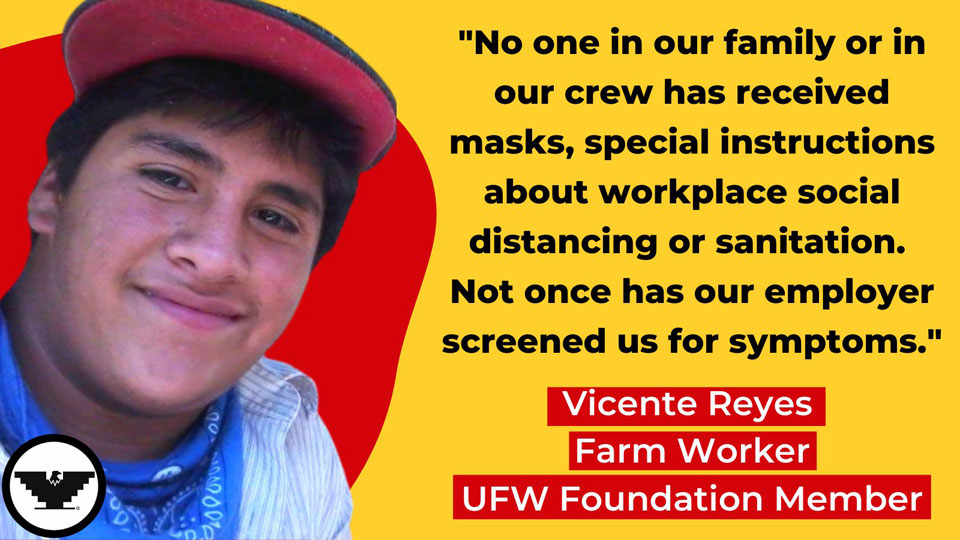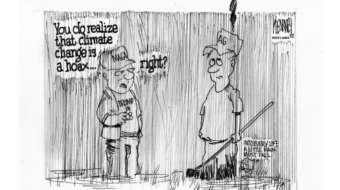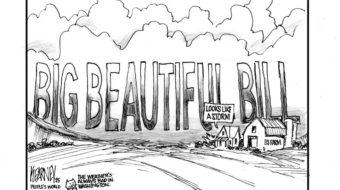
WASHINGTON—Vincente Reyes is a 20-year-old DACA recipient. He’s also a United Farm Workers activist, a college student, and an “essential” worker in this era of the coronavirus pandemic.
And he brought his story, and that of his parents, to a virtual congressional hearing via Zoom, declaring all of them should be able to stay in the U.S. with rights and without fear of deportation.
He’s also not alone. Other witnesses noted that up to 73% of U.S. farm workers are undocumented people, both in and out of the Obama-era Deferred Action for Childhood Arrivals (DACA) program.
Reyes has been picking table-grapes, avocados, carrots, onions, tangerines, beets, kale, lettuce, and potatoes in Kern County Calif., fields for a decade, working alongside his parents, who migrated to the U.S. years ago, he told the House Judiciary Immigration subcommittee’s Sept. 23 hearing on essential, but undocumented, workers.
All three of them still pick crops in fear, not knowing when or if they’ll get picked up themselves by federal Immigration and Customs Enforcement (ICE) agents and deported.
His parents are undocumented people. GOP President Donald Trump, exercising his hate of Black and brown people, is still trying to kill the Obama-era DACA program and deport its 700,000 beneficiaries. He also wants to evict all 10.5 million undocumented people, adults and kids, from the U.S. Failing that, he doesn’t want them counted, either, in the U.S. Census.
DACA beneficiaries include first responders during the pandemic, doctors, caregivers for the elderly, and essential workers like Reyes, who is also a college student and who hopes to get an engineering degree and work for NASA. He’s working his way through college by continuing to pick crops.
But the nation’s broken immigration system provides both DACA recipients and their parents with no path to legalization, much less citizenship. It leaves them in fear and limbo, Reyes told lawmakers.
“As essential workers, we wondered how we could get to work” without being arrested by ICE agents, he testified via Zoom from California. “Would my parents and others be subject to detention and deportation?”
ICE isn’t the only threat to undocumented essential workers, Reyes pointed out. So is the coronavirus. That’s because growers know the undocumented farm workers are afraid to speak out about exploitation on the job lest they be evicted from the U.S. in retribution.
So the employers refused to provide personal protective equipment (PPE) to the farm workers, Reyes testified. That’s even though “more than 400 farmworkers have gotten sick and 30 have died” in Kern County.
Overall, 31,647 people have tested positive for the virus in Kern County, out of 6.94 million in the U.S. since the virus pandemic became official on March 13. And 347 of the nation’s 202,000 dead are Kern residents, too.
The House Democratic majority is trying to stop such ICE detentions and deportations—and undocumented worker exploitation by capitalist farmers. Rep. Zoe Lofgren, D-Calif., the subcommittee chair, noted the panel is pushing HR5038, a bipartisan Farm Worker-supported bill, worked out with growers, to give permanent residence to Reyes, his parents, and other undocumented farm workers whose labor provides the nation’s food.
And Lofgren, Reyes, and other witnesses before the panel, except for the GOP witness, also want to establish a path to eventual citizenship for the migrants. It would involve “blue cards” giving them permanent residence, and rights other U.S. workers have, including the right to organize. The GOP witness, a restaurant owner and legalized migrant from India decades ago to Racine, Wisc., declined to discuss legalization of undocumented people, despite prompting from Republican immigrant haters.
Farm workers in California can organize under a state law, pushed by the Farm Workers more than a decade ago. But outside California and a few other states, notably New York, they can’t. To placate racist Southern senators whose support he needed in 1935, FDR’s National Labor Relations Act excludes farm workers. It also excludes home health care workers, who are majority Black women.
Haeyoung Yoon, policy director for the National Domestic Workers Alliance, which speaks for millions of those home health care workers and other domestic workers also not covered by labor law, made that lack of protection point, too.
“Too many are underpaid, without benefits and are excluded from relief” such as the $600 federal checks that went to millions of jobless workers under the mid-March Cares Act. “An average domestic worker earns $16,000 a year. Only one-fifth have health insurance, and hardly any have any paid leave” to care for themselves or their families who get sick from the coronavirus or anything else.
“Their work is heroic and essential, but they’re not treated as heroes or essential,” Yoon said via Zoom.
The panel hearing was one of a series the Immigration subcommittee has held on the plight of undocumented people in the U.S., and Lofgren used it to again push for comprehensive immigration reform, including a path to legalization, which could take years, for them.
Panel Republicans, led by Ken Buck of Colorado, gave lip service praise to Reyes and other essential undocumented workers—and harped on them “bypassing” the legal immigration system. The GOPers said not a word about employer exploitation of workers, documented or undocumented. The witnesses, and the AFL-CIO, in a supportive statement sent to the subcommittee, did.
“We renew our call for a response to this health and economic crisis that prioritizes all workers, including immigrant and non-immigrant workers. No worker of any status should ever have to risk her life or family for the sake of a job. Nor should any worker have to risk deportation for reporting to work or demanding safe and just treatment,” the statement summarized.
“Officials at all levels of government must act with urgency to ensure that all workers, regardless of immigration status, have meaningful safety supports when reporting to work. Every working family needs access to medical testing and treatment, income replacement, cash payments, and other vital benefits. We are all in this together, and none of us will be safe until all of us are safe,” the federation concluded.










